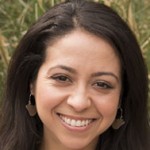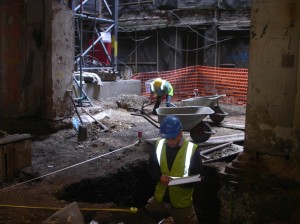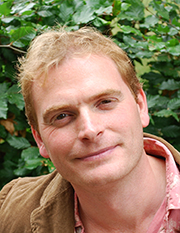As a Palaeoecologist and coming from a Biology and Botany background I have spent a good period of time in the field. My fieldtrips would usually be in remote areas with extreme weather, camping, with no water supply, doing hard muscular work, lifting and carrying heavy material and I have always, so far, been the only woman in the team.
I never even thought about differences amongst the gender in the field until now. I think this may be due to two main reasons:
- I have always been treated as an equal; and
- I always push myself to do as much as I can (no more, no less).
The former means doing loads of muscular work, like carrying 50kg bags uphill (and let’s say that I am not really a weightlifting type of girl; I am more the yoga-lover type really), working in rather cold (when working with snow) or hot (working at 40ºC) conditions if it needed to be, and as dirty (camping and with no running water for two weeks, which means, ehem… not showering for that long) as you can possibly be. Same as everyone in my team, asking about especial comfort was out of the question. When you work with limited resources, you just do what you can without complaining. In this sense I am kind of thankful, because I have learned and achieved a lot in the field, not just for science sake, but for me too. But don’t get me wrong, I am not saying that field work has to be hard; what I want to highlight here is: equality.
The latter reason, for which I never thought about differences, pushing myself to do the best I can, means to me that there is no limit, no limit to grow. There is so much you can do, and of course, the more experience and self-belief, the more you achieve. For example, the field in which we had to carry 50 kg bags (that is just as much as my body weight!) with pieces of kit. That task was more that muscle strength. Let me tell you a little bit about that experience. That was in a fieldtrip to highlands in Ecuador. We were at around 4,000 meters of elevation, which means that every step was already a difficult task. At that altitude there is so little oxygen available, that you think you have just come out of a building in fire, and that it doesn’t matter how deep you inhale, there is no oxygen to breathe! We were at this protected area in the high Andes, and we were left by the reserve guards at the bottom of the hill. No cars could come up… and we needed to go to the top for collecting the samples. We didn’t know that, we didn’t expect we wouldn’t have a lift by car up there. It was three of us, two men and myself. What do you do? Not carrying out that part of the field was out of the question.
So what do you do?… you go for it! We needed to be uphill before the night came (you wouldn’t risk walking on a cliff with 50kg bags in your back, would you?). My team expected me to do the same, they trusted I could do it (we didn’t have an alternative really). So we did it. Every time I took a bag from the bottom to bring it up I felt that was the most difficult and painful part of the field (and I was wrong… but that’s another story) and that I was glad we needed to do that only once. But magically enough I had the strength to do it every time, and not just that, but I kept up with the speed of my male colleagues. Later on, one of my colleagues told me he was impressed in seeing how such a little thing (a.k.a. me) could do that.
What I have learned from those and many other experiences is that I always find the way to go through whatever is needed in the field, and in life. I believe the way you see things and carry out your field trip says a lot about what you expect from yourself in life (which may be a lot more pleasant as well when you do have showers). Did you think about it in that way before? Think about a previous experience in the field (if you have had one, or maybe when you went camping, or for a day trip), did you believe you could do it? If yes, that is great; keep doing it! If not, what can you learn from that trip that may prepare you, empower you for the next one?
I believe field trips are empowering, you do it for yourself and for others. I wonder about the impact I have in other people when I am in the field, do I support and encourage others as much as I like to be supported and encouraged?
Field work is for me not just collecting data or material, it is also about personal achievement, learning from nature and from and with others, it is working as a team (even if it’s just two people), it is growing as a social and empathetic person. Sometimes I think fieldtrips may not happen often enough. I like to make the most of it every time.
 A bit about today’s blogger: Dr Macarena Cardenas first started working in Palaeoecology during her research in her BSc (Hons) and she has been working in this area ever since. Macarena’s previous research has focused in understanding climatic events/change and human impact in Central and Southern Patagonia and on Hyper-diverse Amazonian Ecosystems. Her research is based upon high resolution and multi proxy approach using modern analogues and studying fossil material from profile, bogs and lake sediments. Macarena’s current research, ‘Je Old Landscapes of Southern Brazil’ is focused on understanding the creation and transformation of southern east Brazil landscapes and their relationship with the emergence of social complexity during the past two millennia. This is an interdisciplinary project that integrates archaeology, ethnography and palaeoecology. Specifically Macarena is looking at the relationship between Je groups and the transformation of the landscape, understanding their organisational regional scale in different ecological zones and their role in the expansion of Araucaria pine forest. You can follow Macarena on Twitter.
A bit about today’s blogger: Dr Macarena Cardenas first started working in Palaeoecology during her research in her BSc (Hons) and she has been working in this area ever since. Macarena’s previous research has focused in understanding climatic events/change and human impact in Central and Southern Patagonia and on Hyper-diverse Amazonian Ecosystems. Her research is based upon high resolution and multi proxy approach using modern analogues and studying fossil material from profile, bogs and lake sediments. Macarena’s current research, ‘Je Old Landscapes of Southern Brazil’ is focused on understanding the creation and transformation of southern east Brazil landscapes and their relationship with the emergence of social complexity during the past two millennia. This is an interdisciplinary project that integrates archaeology, ethnography and palaeoecology. Specifically Macarena is looking at the relationship between Je groups and the transformation of the landscape, understanding their organisational regional scale in different ecological zones and their role in the expansion of Araucaria pine forest. You can follow Macarena on Twitter.










